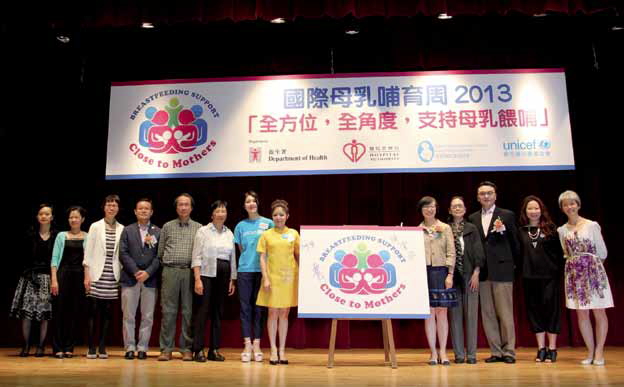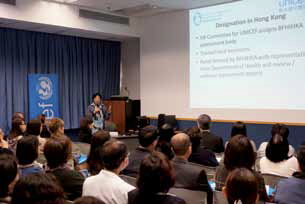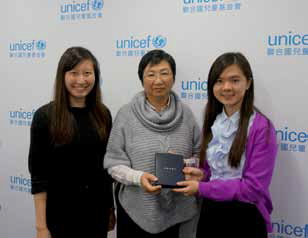© Hong Kong Academy of Medicine. CC BY-NC-ND 4.0
DOCTOR FOR SOCIETY
Safeguarding children’s right to the best form of nurture: an interview with Dr Patricia Ip
Jaime LY Chung
Year 3, Faculty of Medicine, The University of Hong Kong
Ellen HL Mui
Year 3, Faculty of Medicine, The Chinese University of Hong Kong
It is in every mother’s nature to go to the ends of
the earth to secure the best for her baby. However,
are mothers aware that the ability to provide the
best form of nurture to their children has always
lain in their own hands, and is instinctive? This is
what Dr Patricia Ip has been trying hard to protect—breastfeeding as a fundamental human right.
“Breastfeeding is much more than providing
nutrition—it is inherently a form of nurturing
exercise that strengthens mother-baby bonding.”
An experienced paediatrician who has worked for
many years at the United Christian Hospital and
as a Council member of the Hong Kong College of
Paediatricians, Dr Patricia Ip Lai-sheung has become
an iconic figure in the promotion of breastfeeding.
Her enthusiasm is evident in her major contributions
that include serving as the current Vice-Chairperson
of UNICEF Baby Friendly Hospital Initiative Hong
Kong Association, as a member of the Committee on
Promotion of Breastfeeding of HKSAR Government,
and as Chief Editor of ‘Self Learning Kit on
Breastfeeding for Health Professionals’ produced
by the Department of Health. She also has other
interests related to children’s rights, such as fighting
against child abuse. Despite having retired as a
physician in 2007, she has persisted in her voluntary
work in the advocacy of children’s rights. Dr Ip’s
unremitting devotion stems from her deep-rooted
belief that it is a paediatrician’s obligation and duty
to defend a child’s right to the highest attainable
standard of health.
Dr Ip is convinced that the transformation
of the local environment into one that supports
breastfeeding requires the assistance of many
sectors of society. Such work takes time and
requires collaborative efforts. This can range
from teaching the benefits and management of
breastfeeding itself, but also in conjunction with
other topics such as gastroenteritis and obesity, to
health care professionals, to training volunteers
to hold meetings and discussions with employers.
Ultimately, it is about enlightening society so that it
embraces the importance of breastfeeding followed
by the introduction of supportive ancillary facilities
and measures in hospitals, the workplace, and public
areas.
Dr Ip has been concentrating on work to
realise the ideas and objectives of the Baby Friendly
Hospital Initiative (BFHI), a UNICEF initiative to
advocate breastfeeding, in Hong Kong. She has
been voluntarily working for the Baby Friendly
Hospital Initiative Hong Kong Association since
the establishment of its committee in 1992, the
year she was elected as chairperson. One of the
goals of the association is to implement the WHO/UNICEF “Ten Steps to Successful Breastfeeding”
that summarises the maternity practices necessary
to support breastfeeding in hospitals. As part of the
joint statement published by the WHO and UNICEF
in 1989 “Protecting, Promoting and Supporting
Breastfeeding: The Special Role of Maternity
Services”, this set of guidelines aims to encourage
local hospitals to implement policies and provide the
necessary facilities and human resources to support
breastfeeding and hence become ‘baby-friendly’.
She is constantly invited to speak at conferences
and seminars and helped to organise events such as
World Breastfeeding Week, disseminating updates
on breastfeeding support. Dr Ip spares no effort in
developing educational material for mothers and
professionals alike, and encouraging hospitals to be
certified as a ‘baby-friendly hospital’ by implementing
standards of best practice.
Another focus of her work involves monitoring
the marketing of breast milk substitutes. Immersed
in the commercialised ambience of Hong Kong,
parents are often subconsciously bombarded by a
proliferation of literature from companies who claim
that their products are indispensable to a child’s
growth and development. Prevalent propaganda
and advertisements for various milk formulas and
milk substitutes are creating a burgeoning demand
for their products. Mothers are prompted to view
these products as an essential form of nourishment
for their babies. In an attempt to prevent the
commercially partisan promotions by these
companies from governing parents’ perceptions
and concepts of infant nutrition any further, Dr Ip
has led a dedicated campaign to urge businesses to
comply with the “International Code of Marketing
of Breastmilk Substitutes”. She can also be spotted
at legislative committee meetings, providing a
professional opinion on the composition and
labelling requirements of formula milk as well as
regulation of formula milk commercials.
These efforts have not been without obstacles.
Despite an appreciable increase in the rate of
breastfeeding initiation from 19% in 1992 to 84% in
2013, the exclusive breastfeeding rate at 6 months
after hospital discharge and beyond remains low.
This trend signifies an increasing awareness of the
benefits of breastfeeding among Hong Kong mothers
since Dr Ip took the lead in the local journey of
breastfeeding advocacy as chairperson of the Hong
Kong branch of BFHI. Nonetheless obstacles remain
that discourage continuation of breastfeeding:
hospital practices that are not conducive to exclusive
breastfeeding, lack of support after discharge, short
maternity leave, cultural opinion of breastfeeding
in public, and a high dependence on formula milk.
These obstacles remain to be overcome when
protecting the interests of children in Hong Kong.
Twenty years of arduous and collaborative
work has started to show promise: in 2013 the first
hospital in Hong Kong pledged to work towards
designation as a Baby-Friendly Hospital within 5
years. This serves as one of the highest achievements
of Dr Ip and her colleagues. Dr Ip has also been
enjoying the process of facilitating communication
between medical practitioners across domains
and departments, as well as different disciplines
in society. Witnessing concerted efforts that strive
to achieve a common goal has been an immense
source of satisfaction for her. Striving for what she
believes to be right and best for society has been a
long journey, and there have been moments when
progress was slow. Plans have had to be put on hold
because of changes in personnel, but Dr Ip takes
all this in her stride. “Efforts made would never be
wasted. Success may not be achieved all at once, but
you know you are on the right track,” she recalled.
Today, with Dr Ip’s unflinching perseverance along
with the support of her colleagues, four public
Obstetric Units are already on their way to gaining
Baby-Friendly Hospital accreditation. Dr Ip and
her team expect all public hospitals to be Baby-Friendly before 2020, the time frame agreed by the
Hospital Authority. “Once the first successful case is
witnessed, subsequent successful cases would ensue
with much more ease. Having the first Baby-Friendly
Hospital would be a milestone in our strife for the
betterment of the nurture for our children in the
not-too-distant future.”




